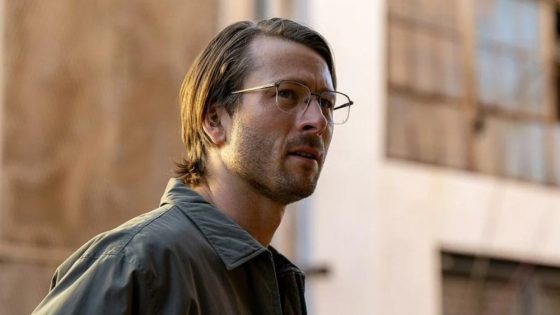Next week, on June 7, the entertaining and highly acclaimed geek-goes-undercover-as-contract-killer screwball romantic thriller “Hit Man,” starring It Dude of the moment Glen Powell, drops on Netflix. But this weekend, in case you hadn’t noticed, the movie opened “in theaters.” How many theaters? If you use your hands and feet to count, you’ll have most of them covered.
Netflix, the company that did for streaming what McDonald’s did for fast food (made it everyone’s new normal), always likes to make a big show of when it’s playing a movie “in theaters.” It has long amused me to see entertainment journalists get suckered into this public-relations gambit, for the simple reason that so many of them live in New York and L.A., where the tiny number of theaters occasionally playing a Netflix movie tend to be. A film opens five blocks from your house, and you think, “Yes, there it is! In theaters.”
But seriously, you could fit the number of people who will see “Hit Man” in theaters onto the head of a pin. It’s a Netflix movie, and it has been ever since Netflix bought it at the Venice Film Festival last September for $20 million. I can’t say how many people will watch “Hit Man” on Netflix, and maybe that number will be huge. Or maybe, as is often the case, we won’t know. (Netflix is a cagey monolith when it comes to revealing viewership numbers.) But here’s something you can take to the bank: When “Hit Man” starts streaming next weekend, the buzz that surrounds it, the avid hum of what we used to call “the conversation,” is going to be…zero. Nada. Crickets. It’s going to be a movie falling in the forest and not making a sound.
Ted Sarandos, the co-CEO of Netflix and its paradigm-setting leader, likes to think of his company as the future. And perhaps it is. But when it comes to movies, or at least the kind of high-profile quality movies that used to be the engine of what we once called, you know, movies, I think of Netflix as the Bermuda Triangle. It’s the ocean of product where films go to disappear.
If “Hit Man” were being released by a conventional studio (if that even exists anymore), and if it were opening next weekend on 2,000 screens, would it be a hit? Who knows? Yet with everything that “Hit Man” has going for it (the freshly minted stardom of Glen Powell, a rash of great reviews, the fact that the movie — though I liked it a notch less than most critics — is Richard Linklater’s diverting and original rendition of a romantic-comedy ride), it’s no stretch to say that it would likely be a solid mid-level performer. I’d wager it could have made a domestic total of $30 to $40 million.
That may not sound like much at a moment when the bottom seems to be falling out of the theatrical motion-picture business. According to the logic of the box office, what Hollywood doesn’t need right now is a quirky philosophical indie rom-com that takes in $35 million. It needs home runs, megahits, stratospheric blockbusters. And yes, it certainly does. But I’d also argue that it’s that thinking — four decades’ worth of it — that’s part of what has made the prospect of a mid-level hit seem so trivial-to-the-point-of-irrelevance. As the film industry, faced with its looming existential crisis, begins to rethink how it does business, one factor that might enter its thinking would be to reconsider the value of hits that are singles and doubles: modestly budgeted entertainments that find their niche. That’s a lot of what movies were, before JawsStarWarsGhostbustersDieHardTerminatorBatmanMarvel. We shouldn’t be dismissing movies that are good enough to win an audience but not big enough to break the bank.
Ted Sarandos doesn’t dismiss them. On the contrary, he keeps buying them. And in doing so, he keeps taking them off the table. Are those two things deliberately connected? For Sarandos, “Hit Man” playing on Netflix is a victory. But for the film industry at large, it’s a defeat. I now have an entire roster of films that have streamed on Netflix, or will in the near future, that could potentially have been theatrical hits. Movies like the fantastic high-finance sexual-politics drama “Fair Play.” Or David Fincher’s hit-man extravaganza “The Killer.” Or “Glass Onion: A Knives Out Mystery.” Or the buzziest film of this year’s Cannes Film Festival, the trans cartel musical “Emilia Pérez” (which Netflix just bought for $8 million).
Each of these movies could have found an audience and, in its way, bolstered the industry. And it’s time that the industry — everyone in it — starts to unite in realizing that the future of movies may depend, in part, on a hundred modest successes, a hundred sparks that stoke a roaring fire. Even if a Marvel movie, or “Godzilla Part 23” or “Inside Out: The Live Action Wow,” doesn’t happen to be coming out that week, the audience still needs to think of movie theaters as places of possibility.
A business observer might say that to save this industry, singles and doubles won’t cut it — that we need grand slams. And it’s true; we do. But one thing the gradual burnout of Marvel-movie addiction has demonstrated is that a top-heavy film industry has the potential to crash in on itself. To save the industry, we need to save and sustain movie culture. Singles and doubles do that. Movies like “Hit Man” and “Fair Play” and “Emilia Pérez” are part of what keep people excited about movies.
Ted Sarandos knows all this. His job is to make Netflix exciting. But I also fear that he has a vested interest in trying to make movie theaters less exciting. That’s a speculative opinion, but Sarandos, cards-close-to-the-vest titan that he is, offered an unusually candid peek into his thinking in the interview he gave last week to the New York Times.
“Oppenheimer” and “Barbie,” he said, would have found just as big an audience on Netflix (which he might be right about, though I doubt it). But then he said, in reference to those films, “There’s no reason to believe that the movie itself is better in any size of screen for all people.” No reason to believe. Actually, for millions and millions of people around the globe, those movies were clearly better because they played as the larger-than-life spectacles they were. Sarandos then told an anecdote that spoke a thousand words, mentioning that his son, a 28-year-old film editor, had watched “Lawrence of Arabia” on his phone. He simply stated it as a fact, but what he was saying is: It’s fine! Why not get with the program and watch “Lawrence of Arabia” on your phone?
And that, in the context of what’s now happening to movie culture, is a casually blasphemous statement. If Sarandos truly believes that size doesn’t matter, and that we might as well be watching “Lawrence of Arabia” on our phones, it’s worth asking: What does he think movie theaters are even good for? Netflix bought a couple of legendary movie theaters (the Egyptian Theatre in Los Angeles, the Paris Theater in New York), and did a splendid job of refurbishing them, and it has done a lovely, if heavily synergistic, job of programming them. So you might say that Netflix officially likes movie theaters. But in another sense, you could say Ted Sarandos thinks movie theaters are mostly good for one thing: to throw a few of his movies into, in a token scattered way, to fool everyone in the industry into thinking that he might be on their side.
Source Agencies



